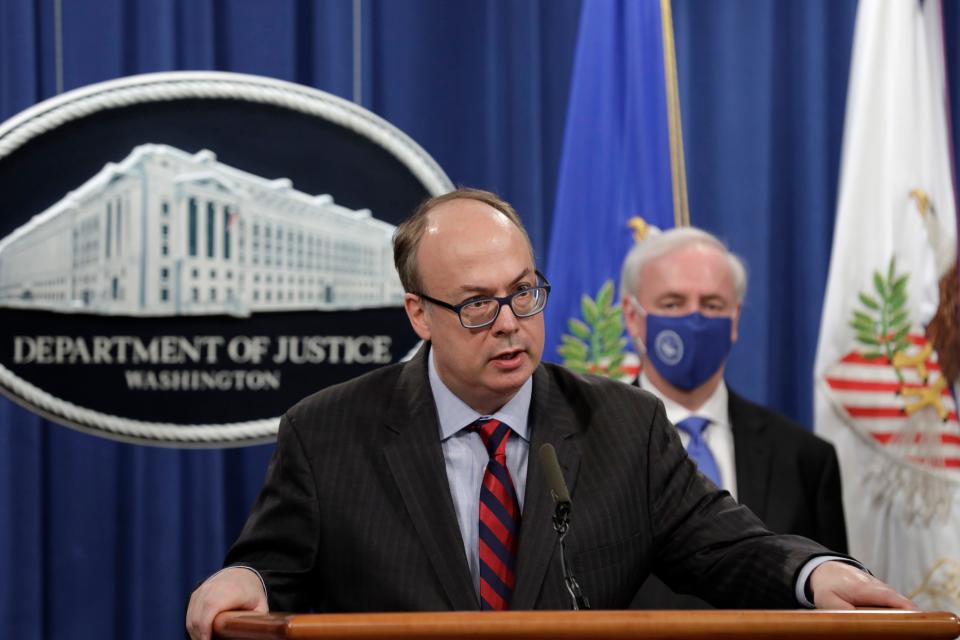House Jan. 6 panel votes to hold ex-DOJ official Jeffrey Clark in contempt for defying subpoena
- Oops!Something went wrong.Please try again later.
- Oops!Something went wrong.Please try again later.
WASHINGTON – The House committee investigating the Jan. 6 Capitol insurrection voted unanimously Wednesday to hold former Justice Department official Jeffrey Clark in contempt for defying the panel's subpoena and to urge the department to prosecute him criminally.
But Rep. Bennie Thompson, D-Miss., who heads the committee, said Clark’s lawyer notified the committee Tuesday that Clark would reappear before the committee and refuse to answer questions based on his Fifth Amendment right against self-incrimination.
The session will be scheduled Saturday, and Clark will be forced to refuse to answer specific questions based on his constitutional right, Thompson said.
Thompson said 250 people have cooperated with the committee and testified.
A House vote to hold Clark in contempt and recommend the Justice Department prosecute him could be averted if he appears and "cures" his refusal so far to testify, said Rep. Liz Cheney, R-Wyo.
“We will not allow anyone to run out the clock,” Thompson said.
If prosecuted, Clark would become the second aide to former President Donald Trump to face charges for his defiance of the investigation. Political strategist Steve Bannon has vowed to fight his criminal charges.

The Rules Committee, which sets the rules for floor debate, held a hearing Thursday on the contempt measure. But the chairman, Rep. Jim McGovern, D-Mass., said the panel wouldn’t report the measure to the House floor until after Clark meets with the investigative committee on Saturday.
“The issue of preserving our democracy is too important to let anyone stonewall or try to hide the truth,” McGovern said. “This is not some witch hunt. This is not about trying to use the legal system to target those involved with the prior president.”
The top Republican on the panel, Rep. Tom Cole of Oklahoma, called the case inherently political and said the courts must resolve Trump’s claims of executive privilege.
“This is an arbitrary and punitive decision,” Cole said of the contempt citation and recommendation for criminal prosecution. “It’s nothing more than political theater.”
The House investigative committee subpoenaed Clark as part of its investigation to piece together what led to the attack on the Capitol and how the White House responded that day. About 140 police officers were injured. Police fatally shot a woman outside the House chamber as the counting of Electoral College votes was temporarily halted.
Thompson said Clark appeared to be central to Trump’s efforts to overturn the election.
“The assault on the rule of law didn’t end. It escalated,” Thompson said. “It resulted in a violent attack on the seat of our democracy. What the former president’s inner circle couldn’t achieve with lies and unsupported lawsuits, a mob of rioters tried to do by force.”
Cheney said Trump tried to appoint Clark as acting attorney general in order to distribute a corrupt letter calling the election stolen, even after the Justice Department said repeatedly the election was fair and the results certified.
But a group of top department officials confronted Trump and prevented the appointment by threatening to resign. Cheney said lawmakers want to ask Clark about that episode.
“They faced down President Trump in the Oval Office and forcefully told him no," Cheney said. "They would not allow the Department of Justice to be turned into an arm of President Trump’s campaign to overturn the presidential election.”
Cheney said the investigative committee expects to hold weeks of public hearings next year about what they find.
Trump is fighting a committee subpoena for documents from the National Archives and Records Administration. A three-judge panel of the D.C. Circuit Court of Appeals held a hearing Tuesday about whether Trump's claim of executive privilege should keep the records confidential or they should be released because President Joe Biden waived the privilege.
Clark seen as key player in Trump's efforts to undo election
Clark, a former acting assistant attorney general during the final days of the Trump administration, submitted a letter to the committee through his attorney claiming that he would decline to testify Nov. 5, citing Trump's assertion of executive privilege, attorney-client privilege and as part of the executive's deliberative process.
Clark's lawyer, Harry MacDougald, said the 12-page letter explained why "we do not intend to answer any questions or produce any documents today, but we have appeared in compliance with the subpoena in order to assert those objections, as opposed to just refusing to show up," according to the transcript.
The committee subpoenaed Clark on Oct. 13, after he emerged as a central figure in the former president's efforts to deny Biden's election. Clark was subpoenaed to discuss his efforts to enlist the Justice Department in an effort to sow doubt in election results in Georgia.
Clark was featured prominently in a damning Senate Judiciary Committee report that found he attempted to countermand the top leaders at the department by drafting a letter to Georgia officials seeking to delay the state's certification of election results.
According to the Senate committee report, Clark sought to enlist then-acting Attorney General Jeffrey Rosen to assist in "Trump’s election subversion scheme," telling Rosen that he would decline Trump's offer that he take Rosen's place if Rosen agreed to join.
More: Timeline: How the storming of the U.S. Capitol unfolded on Jan. 6
The Senate report also recounted a contentious Oval Office meeting Jan. 3, when Richard Donoghue, then-acting deputy attorney general, warned that a mass resignation of Justice Department officials and federal prosecutors would follow if Trump moved to replace Rosen with Clark to aid the president's election subversion scheme.
This article originally appeared on USA TODAY: Jan. 6 committee votes to hold Jeffrey Clark in contempt over subpoena

